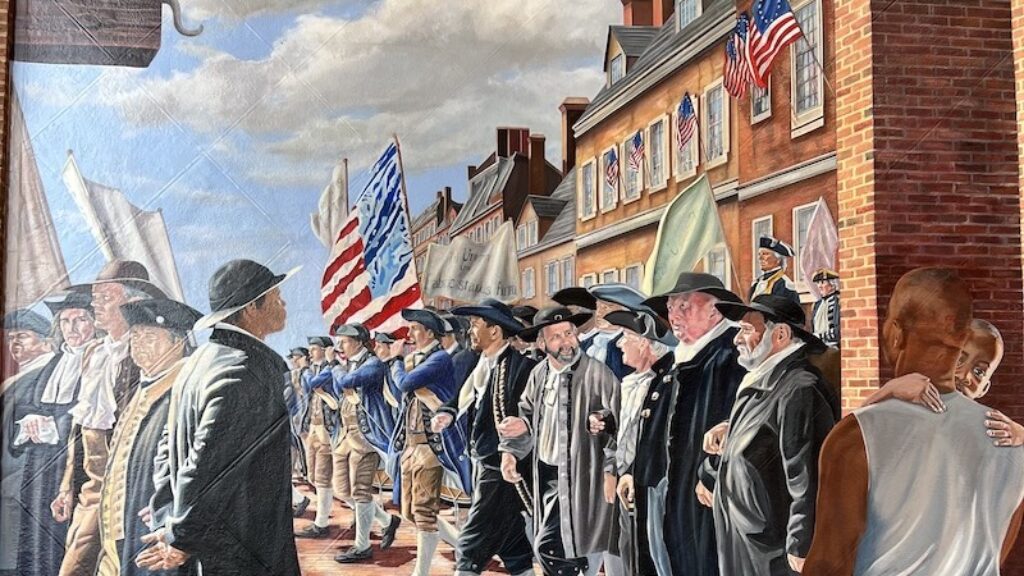Letters, Fall 2021
We and I
In reading Matti Friedman’s witty, trenchant review of the new biography of the entrepreneur, con artist, and would-be kabbalistic guru Adam Neumann (“WeShtick,” Summer 2021) immediately after reading Judith Shulevitz’s brilliant, tough-minded review of Blake Bailey’s now-scandalous Philip Roth biography (“Getting Out from Under: The Philip Roth Story,” Summer 2021), I couldn’t help but wonder what Roth would have made of such a character as the WeWork CEO. Imagine the literary fun that he and his alter ego, Nathan Zuckerman, could have had with this six-foot-five shaman entrepreneur with his glittering entourage, Buberish babble about the power of we, and apparently genuine belief that his office rental company would rule the world! Would Roth have depicted Neumann’s childhood kibbutz? And what would he have done with the charlatans of the Kabbalah Centre?
Of course, one thing that Roth and Neumann had in common was that they were narcissists. But having thought more about Shulevitz’s critical argument, it now occurs to me that their differences were even more important. Neumann’s narcissism was central to his achievement of conning venture capitalists like Masayoshi Son out of billions of dollars. But it was precisely Roth’s achievement, at least in his best novels, to overcome his narcissism and see himself and others with unflinching insight and honesty. For all his talk of we, I don’t get the impression that Neumann was ever able to step outside himself, let alone crack a joke.
Lillian Katz
London, United Kingdom
It’s a Novel
I regret that Allan Arkush didn’t like my new book, but not as much as I regret that he seems to have forgotten—or not noticed?—that The Netanyahus is a novel (see “Fictional Revisionism,” jewishreviewofbooks.com). I suppose I could use this letter to explain what that means, or what that should mean, in a few funny sentences, but then what would be the point? Arkush doesn’t share my sense of humor.
I should better spend my time clearing up a few things—a few mistakes, which I don’t want to end up reading on Wikipedia:
- The book never states that Corbin College, later Corbin U, “is” Cornell. Fair Corbin is a far less illustrious institution and bears just about as much resemblance to Arkush’s alma mater as SUNY Fredonia bears to, well, the Marx Brothers’ Freedonia.
- The fictional (I can’t believe I’m reminding you: fictional) letter of recommendation that Arkush unpacks is not meant to be a comprehensive history of Zionism. It is meant to be a fictional (I can’t believe I’m reminding you: fictional) letter of recommendation. Still, the corrections that Arkush offers are half split-hair quibbling and half just flat-out wrong . . . for example:
- Arkush writes, “In fact, Jabotinsky never declared himself to be the mortal enemy of the British. As Anita Shapira has written, ‘He demonstrated his loyalty to, and friendship for, Britain throughout the course of his entire political career.’” Seriously? Jabotinsky was arrested and imprisoned by the British. His publications were routinely shuttered. Eventually, he was banned from Mandatory Palestine altogether. It’s true that if you read VJ’s speeches and journalism, you’ll find that he tried his best to be polite to the British—he, yes, “demonstrated his loyalty”; he kissed the ring and flaunted his manners, trying to catch more flies with honey than with vinegar. This, I’d imagine, is good diplomacy, good statecraft. But the idea that he demonstrated “friendship for, Britain throughout the course of his entire political career” is total nonsense. Jabotinsky conducted an on-and-off guerilla war against the British for decades, and I’d suspect that his true feelings for the lesser of two evils (the greater, to him, being Arabs) are most clearly revealed on the occasions he went off script. In 1932, for instance, when he infamously speculated (threatened?) that “the Jews might become the dynamite that will blow up the British Empire.” In that same speech, he declared that the hatred that every Jew once felt toward Russia will now be directed at England, which “has deceived us, destroyed our hopes, and we shall proclaim her lie to the world.” I could go on and on, but . . . I’m a novelist.
- Arkush writes that Benzion Netanyahu “would never have claimed . . . that the mass conversion of Spanish Jews to Christianity before the establishment of the Inquisition was ‘not compelled, but voluntary.’” Really? The Marranos of Spain, B. Netanyahu, page 96: “By 1415, voluntary conversion was not a minor current. . . . And it was this decisive fact, more than anything else, that engendered the opinion . . . about the ‘great betrayal’ of the Jews of Spain.” The Marranos of Spain, by B. Netanyahu, page 121: “The very fact that most of Spain’s Jews were now in the Christian orbit, and that the voluntary converts now constituted the majority of the Marranos, made clandestine Jewish life, and further resistance to assimilation, appear more futile than ever before.” Netanyahu mentions the pre-Inquisition voluntary conversions most prominently in The Origins of the Inquisition in Fifteenth Century Spain, dedicating dozens of pages to the phenomenon. I suspect that Arkush flagged this because he thinks I’m having my (again) fictional Netanyahu use the word “voluntary” in some happy giddy way, so let me assure him that I’m not. Maybe what he should do is this: Take a, say, yellow highlighter and highlight each time the word “voluntary” appears in my text. This yellow highlighter will be our special sign for IRONY. . . . Or maybe it’d be better if he just crossed out every “voluntary” and replaced it with “ironic” (and every “voluntarily” with “ironically”)? Like so: The mass conversion of Spanish Jews was not compelled, but ironic. . . . It’s amazing what you wind up doing ironically after a review like a pogrom.
Joshua Cohen
via email
Allan Arkush responds:
Joshua Cohen wants to have it both ways. When he creates a wildly implausible scenario about real historical people or ventriloquizes potted, misleading history through an academic character, well, then he’s just a writer of fiction. But he also insists that he and his character are actually right about Jabotinsky and that Anita Shapira, a leading historian of Zionism whom I quoted in my review, was spouting “total nonsense.” He also attempts to paper over his misunderstanding of the claims of Benzion Netanyahu (the former prime minister’s historian father) about Spanish Jewry before the Inquisition. He seems to have mistaken cherry-picking quotesfor historical research, the kind of thing that one might expect from one of the students at his fictional (yes, fictional) Corbin College.
Cohen’s protestations as a novelist notwithstanding, The Netanyahus: An Account of a Minor and Ultimately Even Negligible Episode in the History of a Very Famous Family comes with a postscript to assure the reader that there is a historical kernel of truth in his story. The late literary critic Harold Bloom, he tells us, liked to tell him the story of hosting Benzion Netanyahu and his young family during his disastrous academic job talk in the 1950s (though Cohen has also admitted to interviewers, he changed it a little with each telling). Moreover, Cohen has tracked down the girl in Bloom’s story and reproduces the over-the-top email from her in his postscript, which I quoted in my review. Or perhaps he hasn’t; maybe that, too, is a bit of ironic metafictional game playing. One thing is certain, however: the attention this book has received is predicated on it being an at least true-ish story about “a very famous” and widely reviled political family, and Cohen and his publisher know it.
Imagine now that having heard the very same anecdote from Harold Bloom but knowing that Bloom was famous for telling tall tales—he liked to tell students that the scar on his forehead was the result of a bullet wound he received during the Israeli War of Independence, when in fact he wasan undergraduate at Cornell—Cohen decided to tell the very same story in the very same words but called it The Etzionis: An Account of a Minor and Ultimately Even Negligible Episode in the History of a Very Fictional Family. As a work of fiction, nothing would have changed except for a few proper names and the cutesy postscript, but would the New York Times’ critic call it “a history lesson”; would the Wall Street Journal call it “an ideological origin story”? Would its feeble wit have been widely celebrated? Foreign Policy certainly wouldn’t have headlined its review “How the Etzionis Explain the World.” In fact, it wouldn’t have reviewed it at all. And I doubt very much that any Jewish intellectuals would have been chuckling this summer over the crude, shambolic goings-on in Cohen’s book if they weren’t supposed to be about Bibi’s family.
One doesn’t have to be an admirer of the Netanyahus, or ofJabotinsky, for that matter, to see Cohen’s fabrications and distortions as cheap and wrongheaded. Neither the things the British did to Jabotinsky in Palestine nor a belligerent oration he delivered in Warsaw substantiate the claim that he was a mortal enemy of the British. Completely losing sight of Jabotinsky’s ongoing openness (even in his last book, in 1940) to the creation of a Jewish state that would be a dominion of the British Empire, Cohen asserts that he was engaged in “an on-and-off guerilla war against the British for decades.” This actually is nonsense, a confusion of the actions of the Lehi and the Irgun in the 1940s, after Jabotinsky’s death, with what Jabotinsky himself did in the 1920s and 1930s.
In my review, I wrote that Benzion Netanyahu never claimed that the mass conversion of Spanish Jews before the establishment of the Inquisition was “not compelled, but voluntary.” Cohen triumphantly notes the numerous occasions on which Netanyahu discussed the voluntary conversion of Jews to Catholicism during the fifteenth century. What he fails to mention is that Netanyahu related how this took place in the aftermath of the cleric Ferrand Martínez’s anti-Jewish campaign in 1391, which he described as “the only pogromist movement in Jewish history that inscribed on its banner the conversion of the Jews.” Netanyahu stressed that this fiercely violent persecution “facilitated the transfer of many Jews to Christianity; and thus was born the converso problem” (The Origins of the Inquisition in Fifteenth Century Spain). The real Benzion Netanyahu saw the forced conversion in 1391 as a crucial factor in setting the stage for the only kind of conversion that Cohen’s Netanyahu or Cohen himself is prepared to acknowledge.
An issue that Cohen doesn’t address in his letter is the question of when the purported event behind his novel took place. In my review, I noted that I attended Benzion Netanyahu’s (successful) job talk at Cornell in the school year 1970–1971, but that it can’t have been the basis of Cohen/Bloom’s academic tale of the late 1950s. I have since learned that in the fall of 1957, Isaac Rabinowitz was installed in the Cornell Classics Department as a professor of biblical and Hebrew studies, and Benzion Netanyahu might have competed with Rabinowitz for the position, along with Nahum Sarna (though I can’t confirm that he actually did). However, by that time, Harold Bloom was at Yale, having received his BA from Cornell in 1951—making his anecdote, at best, yet another tall tale, in which he placed himself at the center of an episode that he might have heard something about and then went on to embroider with all sorts of improbabilities . . . which Cohen then further fictionalized, leading to the novel before us, which is neither funny nor “a history lesson.” One thing Cohen is right about is that I don’t share his sense of humor.
Suggested Reading

WeShtick
Neumann’s kibbutz identity was part of his personal brand to such an extent that when puzzled onlookers spotted him walking barefoot on a Manhattan street, raising questions about his mental health, one of his publicists explained, “He is a kibbutznik.”

Spanish Charity
The sight of a secular Israeli artist in a cathedral confessional in Spain is one of the more interesting moments in recent Israeli fiction. A new novel by A.B. Yehoshua.

Instagramming the Holocaust
This Holocaust Memorial Day, an online project known as Eva’s Stories is uploading snippets of video every 30 minutes to the @eva.stories Instagram page.

When Freedom Began to Ring
How the land of opportunity became the opportune land for Jews to thrive.
Comments
You must log in to comment Log In